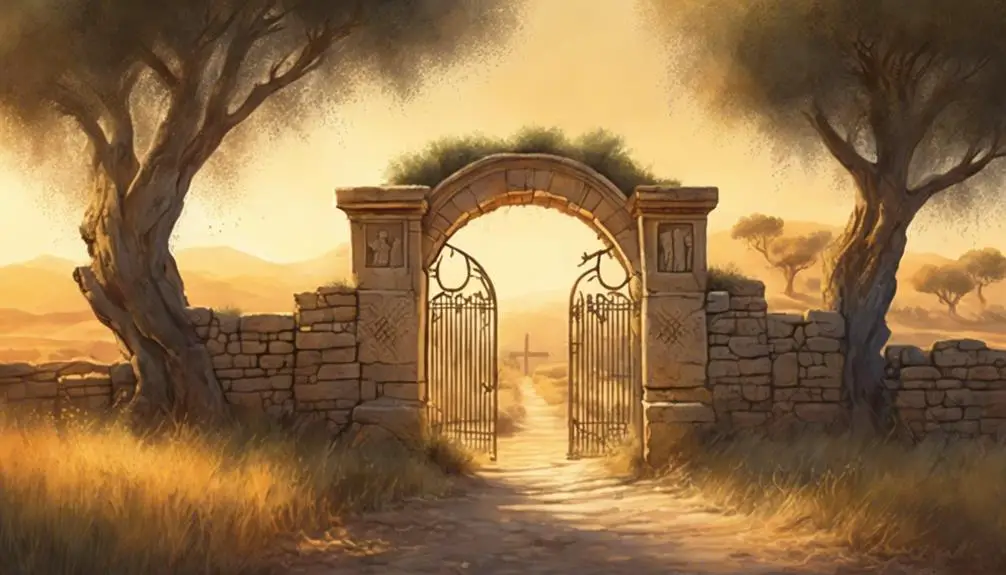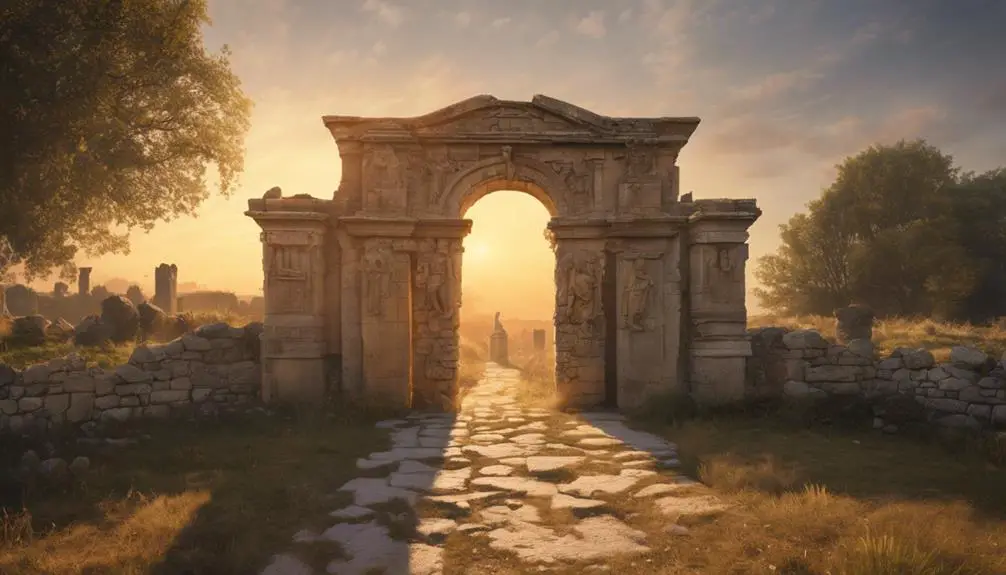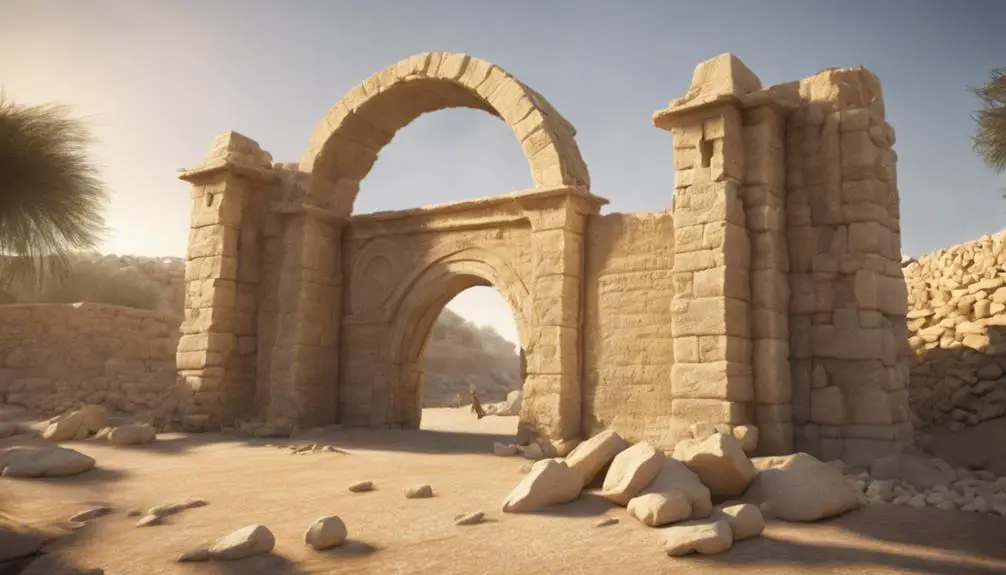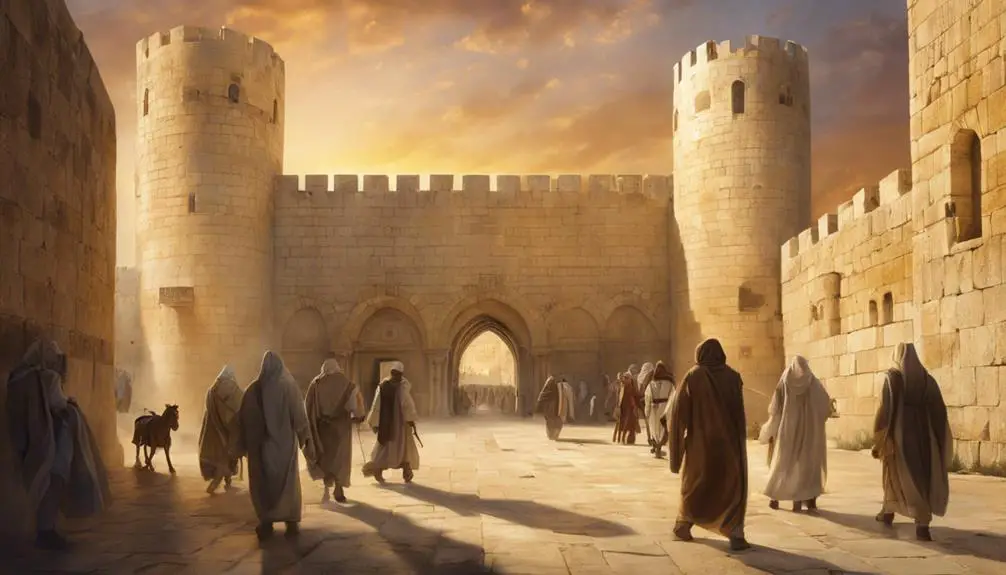Take a riveting journey into the East Gate's biblical significance, its rich history, and prophetic implications that continue to captivate scholars.

East Gate in the Bible
Ever wondered why the East Gate, also known as the Golden Gate, holds such significance in biblical texts? It's a question that's likely crossed your mind if you've spent some time exploring biblical archaeology or prophecy.
The East Gate, steeped in ancient history and symbolism, plays a central role in many prophecies, and its physical remains are a testament to Jerusalem's rich past. But what exactly makes this gate so special?
To fully grasp its importance, you'll need to dive deeper into its historical context, symbolism, and prophetic implications.
Historical Context of the East Gate

To fully grasp the significance of the East Gate, you must first delve into its historical context, tracing its roots back to ancient times in biblical Jerusalem. This gate, also known as the Golden Gate or the Beautiful Gate, wasn't a mere architectural structure; it held immense cultural significance.
The gate's construction process started around 6th century BC, as part of Jerusalem's protective wall. It's believed that the gate was built by artisans who'd returned from the Babylonian exile, combining their skills with local techniques to create a unique structure, demonstrating an impressive blend of cultures.
The East Gate was more than just a passage; it was a symbol of cultural fusion and resilience. Kings, warriors, and prophets passed through this gate, each leaving an indelible mark on its stones. The gate stood witness to pivotal moments in history, withstanding invasions, conquests, and destruction, yet it remained standing, a beacon of Jerusalem's enduring spirit.
As you explore the East Gate's historical context, you'll discover its rich tapestry woven with tales of courage, faith, and survival. Its construction wasn't just an architectural feat but a testament to a civilization's tenacity and cultural evolution.
Symbolism Attached to the East Gate

Delving into the symbolism of the East Gate, you'll find it's not just a physical structure, but a profound symbol permeated with deep religious and cultural meanings. This gate holds crucial significance in biblical texts, associated strongly with Gate Guardianship and East Orientation.
- Gate Guardianship: The East Gate was traditionally guarded by Cherubim, divine entities symbolizing protection. You can interpret this as the East Gate being a sacred threshold, secured by divine forces.
- East Orientation: The East Gate's positioning played a symbolic role too. The east, where the sun rises, has always represented new beginnings and hope.
- Place of God's Appearance: In the Bible, God's glory often appeared from the east, enhancing the spiritual significance of the East Gate.
- Access to Holiness: The East Gate was a pathway leading to the temple, symbolizing the journey towards spiritual enlightenment and holiness.
The East Gate isn't merely a geographical point or architectural element; it's a symbol of divine guardianship, hope, divine presence, and spiritual journey. This intricate symbolism affirms the East Gate's revered status in biblical texts. In understanding this, you deepen your appreciation of its place in religious and cultural contexts.
East Gate in Biblical Prophecy

Building upon the symbolic significance of the East Gate, let's now explore its role within Biblical prophecy, a fascinating aspect that further underscores its spiritual importance. The East Gate, also known as the Golden Gate, holds a significant place in Prophecy Interpretations. It's believed that this gate, sealed since medieval times, will open only for the Messiah's triumphant entry, aligning with Messianic Expectations.
According to the prophecy in Ezekiel 44:1-3, the East Gate is to remain shut because the Lord, the God of Israel, has entered through it. The gate will only reopen for the Prince, interpreted by many as the Messiah. This prophecy has influenced Jewish, Christian, and Islamic eschatology, with each harboring unique perspectives.
For Christians, this prophecy is often linked to Jesus' second coming. The closed gate signifies the world's current state, awaiting the Messiah's return. Jewish interpretations, on the other hand, anticipate the arrival of a future Jewish Messiah. This prophecy has also found resonance in Islamic beliefs, where it's believed the gate will open for their expected Mahdi.
Archaeological Evidence of the East Gate

Unearthing the past, you'll find compelling archaeological evidence supporting the existence and significance of the East Gate, painting a vivid image of its historical prominence and spiritual importance. This evidence substantiates the biblical references to the East Gate, a key site in ancient Jerusalem, and offers insights into the architectural techniques of the time.
In your exploration, you'll encounter four key pieces of evidence:
- Archaeological remains of the gate's construction, showcasing intricate stonework and design, revealing the high degree of skill possessed by the builders.
- Tools and materials used in the gate's construction, providing insights into the technological capabilities of the era.
- Layers of sediment and debris, indicative of the gate's age and the civilizations that occupied the city over the centuries.
- Artifacts and relics found near the gate, offering glimpses into the daily life and religious practices of the inhabitants.
These findings, unearthed using advanced excavation techniques, demonstrate the historical reality of the East Gate. This gate isn't just a biblical symbol, but a tangible piece of history. By piecing together the archaeological evidence, you're not only confirming the gate's existence but also deepening your understanding of its cultural and spiritual significance.
East Gate's Role in Eschatology

Having explored the tangible proof of the East Gate's existence, let's now turn our attention to its significant role in eschatology, the branch of theology concerned with the final events in the history of the world or of humankind. The Gate's significance in this context is substantial, serving as a metaphorical portal between the earthly realm and the divine, a pivotal point in the eschatological narrative.
Eschatological interpretations of the East Gate have been varied, yet they all underscore its crucial role in the end times. Often, it's viewed as the pathway through which the Messiah will return, marking the onset of redemption. This interpretation stems from the prophecy in Ezekiel 44:1-3, where it's stated that the gate shall remain closed because the Lord, the God of Israel, has entered by it.
Moreover, the East Gate's role in eschatology isn't confined to Christianity. In Jewish tradition, it's also believed to be the gate through which the Messiah will make his triumphant entry into Jerusalem. Its sealed state is considered an emblem of anticipation for the coming Messiah.
Conclusion
Just as dawn breaks in the east, the East Gate holds a pivotal place in biblical lore and prophecy. It's not just a physical structure, but a symbol, a promise, a prophecy.
The bricks and mortar may crumble, yet its theological significance remains steadfast. This gate, shrouded in mystery and steeped in antiquity, continues to be a compelling compass in biblical scholarship, pointing us towards a deeper understanding of eschatology.



Sign up